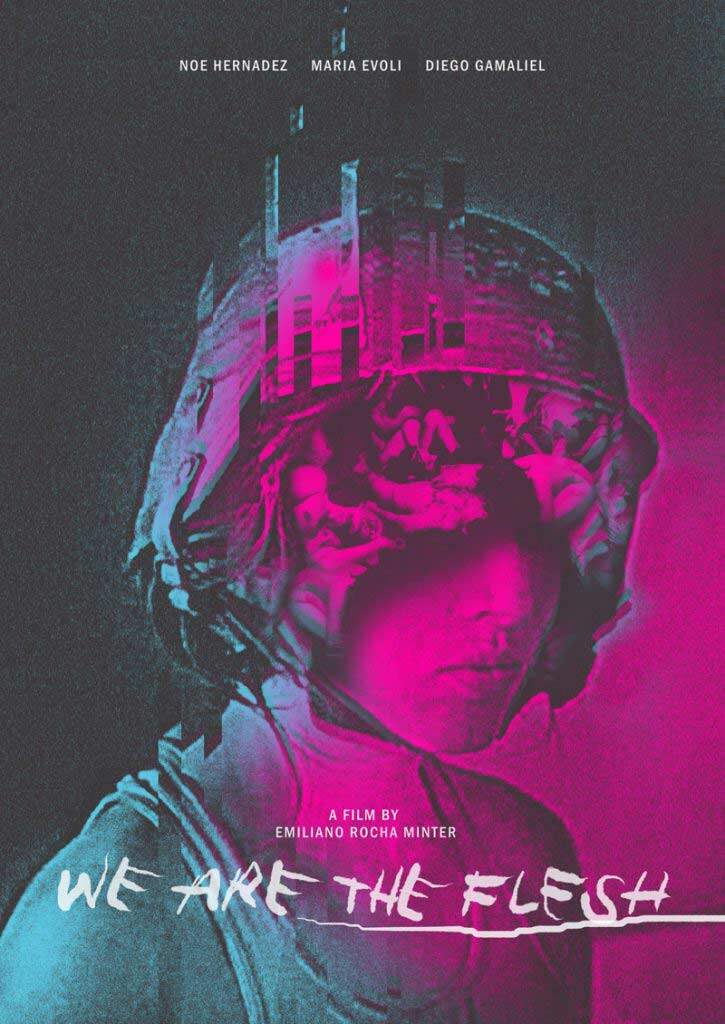History is littered with questions as to the validity of extremism in art and media. Traditional English-speaking sensibilities all but protect us from the taboo-destroying underground world of experimental cinema, a place until now reserved for those who were prepared for a deep-dive into their local video rental store or, more recently, the internet. That being said, if I see that a horror film originated in the likes of France, Japan or Korea, to name a few, I know I may be in for a bit of a ride. At least I could be about to see something I had, through cultural linearity, never seen before. When I discovered Arrow Video’s release of We Are The Flesh (2016) promising an extreme and uninhibited French-Mexican horror experience, I was cautiously optimistic.
Written and directed by Emiliano Rocha Minter, it’s a gleefully depraved slice of post-apocalyptic experimentalism. Beginning with a brother and sister (played by Diego Galamiel and María Evoli, respectively) discovering the makeshift lair of a primitive loner (Noé Hernández) after wandering a seemingly ruined city for ‘days’, the loner offers them refuge under his own, as of yet unknown conditions. Before long the ethos of this energetic stanger has leached fully into their minds, as well as our own, and from here We Are The Flesh consistently ups the ante until we’re sure we’ve seen it all. Displaying shockingly brash instances of sex, torture, murder and cannibalism, one would be forgiven for assuming that this is simply another exercise in shock horror and likely deserves the dreaded ‘Torture-Porn’ moniker.
What Genre is We Are the Flesh?
The fact is, Minter’s directorial feature debut is far too intelligent to fall into such derogatory categories. The full commitment to its views, monologued with gusto by Hernández, completely backs the primordial hedonism to follow. As he bangs his drum and screams of deep phenomenology and the freedom of primitive chaos, viewers can’t help but be sucked into his words, nodding along and cheering for things that would have otherwise disgusted them. The core themes of his diatribes being isolation and the liberation it has afforded him, these matters could not be more apt for times like these. Rather than condemn his seclusion, he describes its effects with violently joyous energy. He speaks lovingly of mankind’s dual and savage nature as beasts who only suppress their most ancient of instincts, urging his new acquaintances to do away with the thin frameworks of moral decency that only other people held in front of them.
“The spirit doesn’t reside within the flesh; The spirit is the flesh!”
The storytelling is vague and often confusing. The destruction of the outside world is only hinted at by the state of the converted apartment block the characters reside in. Many elements are implied and only fall into place in the final moments leading to an ending that makes any right-minded viewer question everything they have seen, their own values, and likely those of the entire human race. This is the essence of experimental horror.
Shock or Thought Provoking Imagery, Maybe Both?

We Are The Flesh left a hell of an impression on me; the type you sit and ponder for a time, probably long after the credits roll. While a lot of people won’t make it to that point, and some may even react negatively at being shown such an uncompromising film. But that’s where the true point of cinema like this lies, for me anyway. If someone becomes joyous or angry or upset at what they see then they’re making a decision on it; for better or worse it has made them think. Either we reject the new and strange ideas being shown to us or we embrace them for all of their gleeful depravity. These long, unbroken scenes of increasingly bizarre, deviant sex and violence will unnerve even seasoned horror fans and, elite as it may sound, only those with the capacity and intent to soak in the true meanings behind the insanity will gain anything from their viewing. If Hernández chanting, flapping his arms like a bird and appearing like something between Gollum and Dennis Hopper in Blue Velvet (1986) doesn’t spark at some primitive charge in your brain then what follows will only deepen your confusion.
Through focused cinematography, blistering intelligence and chilling commitment to performances, We Are The Flesh is one of the finer experimental horror films I have subjected myself to. While appreciators of this type of art remain in the few, this is one of the more accomplished pieces of work that could take its shameless style to a wider audience. That being said, I won’t be recommending it to any family members.
Joe first knew he wanted to write in year six after plaguing his teacher’s dreams with a harrowing story of World War prisoners and an insidious ‘book of the dead’. Clearly infatuated with horror, and wearing his influences on his sleeve, he dabbled in some smaller pieces before starting work on his condensed sci-fi epic, System Reset in 2013.Once this was published he began work on many smaller horror stories and poems in bid to harness and connect with his own fears and passions and build on his craft.
Joe is obsessed with atmosphere and aesthetic, big concepts and even bigger senses of scale, feeding on cosmic horror of the deep sea and vastness of space and the emotions these can invoke. His main fixes within the dark arts include horror films, extreme metal music and the bleakest of poetry and science fiction literature.
He holds a deep respect for plot, creative flow and the context of art, and hopes to forge deeper connections between them around filmmakers dabbling in the dark and macabre.

